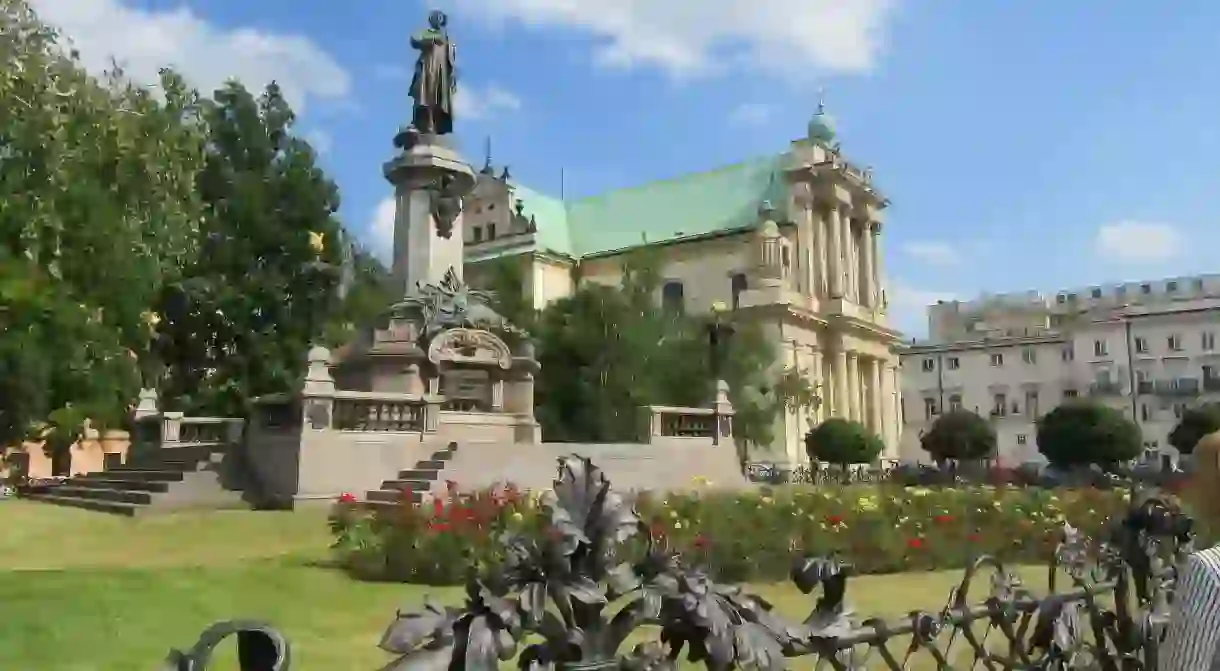The 11 Most Iconic Statues in Warsaw, Poland

With its beautifully reconstructed Old Town Square, multiple palaces, intriguing museums and a rich history, Warsaw is a city that has been through both good and bad times. Many local heroes are remembered here with their own iconic statues. Here’s our pick of the best.

The Warsaw Mermaid
Market, Historical Landmark

The Mermaid is quite simply the icon of Warsaw, appearing on the city’s coat of arms and being synonymous with all things Warsaw. The main statue sits in the centre of Warsaw’s Old Town square and continues to be one of the most photographed locations in the entire city. Warsaw’s Mermaid shows a bit more than most – she is prone to partial nudity with her bum on display and her fish tail being very low cut – and holds a sword and shield.
Józef Piłsudski
Poland disappeared from the map for a while and this man, Józef Piłsudski, is a hero to many for his part in forming the Second Polish Republic and bringing the country back after a 123-year absence during a time when it was annexed by Russia, Austria and Prussia. Piłsudski was the First Marshall of Poland and the leader of the country when it returned in 1918.

King Zygmunt
One of the most memorable statues in Warsaw for tourists will be the King Zygmunt statue. Despite being one of the tallest and largest statues on this list, it’s actually hard to see King Zygmunt up close. That is because his statue sits atop the famous Zygmunt’s column in Warsaw Old Town. The column was built as King Zygmunt III decided to move Poland’s capital city from Krakówto Warsaw in 1596. Zygmunt is known for his immortal quote: “Did you ever see Warsaw as beautiful as you saw her tonight?”.
Maria Skłodowska (Curie)
Museum, Park

Maria Skłodowska (Curie) is a hero of the city, having been born in Warsaw before moving to France. Maria is still the only woman to win the Nobel Prize twice and in two different sciences – physics and chemistry. She pioneered research on radioactivity and later married a Frenchman and finally died in France. In her home city she is fondly remembered with a statue as well as a museum. Maria also has a park and a street named after her.
Frederic Chopin
Museum
Poland’s finest pianist and composer, Frederic Chopin grew up in the city. Not only does Chopin have a museum dedicated to him, but there are benches all over Warsaw that play the music of Chopin on the press of a button! Warsaw’s beautiful Łazienki Royal Gardens is a venue that plays host to marvellous Chopin concerts in the summer months. All year round however, the man is remembered with his own exquisite and memorable statue.
Nicolaus Copernicus
Memorial
Nicolaus Copernicus was a Polish-born mathematician and astronomer who created the idea that it is the Sun rather than the Earth which sits in the centre of the universe. In this statue, Copernicus holds a compass and a sphere in an unmissable and prominent memorial on the main street Krakowskie Przedmiescie, which links Nowy Świat to the Old Town.
Warsaw Uprising Monument
Put simply this monument (which is actually more than one statue) is often dubbed the most important monument of post-war Warsaw. It is dedicated to the Warsaw Uprising of 1944 and is one of the most visited landmarks for foreign tourists.
Pope John Paul II
Church
Poland’s well respected Pope Jan Pawel II (John Paul II) is remembered with a statue outside the Church of All Saints (Kościół Rzymskokatolicki Pw. Wszystkich Świętych) which is located near Świętokrzyska Metro Station. John Paul II was head of the Catholic Church from 1978-2005 and is considered a national hero. He is also credited with having played a role in the events that led to the end of Communist rule in his native Poland and all over Europe.
Józef Poniatowski
Józef Poniatowski’s statue is on Krakowskie Przedmieście in the courtyard of the Presidential Palace. Poniatowski rides a horse and holds a sword. He is a heroic Polish-born general, who fought in many wars and battles and became a Marshall of the French Empire. A little-known fact about this statue is that it was once relocated to the Polish town of Dęblin.
Kazimierz Deyna
Stadium
Poland’s sporting heroes are also well remembered, none more so than Kazimierz Deyna. Deyna was the Polish national team captain during the country’s 1970s football successes. Deyna was top goalscorer in the 1972 Olympics and led the team to the gold medal in 1972 and the silver medal in 1976. In the 1974 World Cup, despite having the best record in the competition, Poland finished third. Locally here in Warsaw, Deyna is a hero for Legia Warsaw fans and as such his statue with a football at his feet appears outside the stadium. Deyna hailed from the town of Starogard Gdański, where he also has a statue, and a stadium named after him.
Praskiej Kapeli Podwórkowejw Warszawie
Probably the least well-known statue on the list is the musical band known as Praskiej Kapeli Podwórkowejw Warszawie. This is located on the other side of the river in Warsaw’s Praga district, and features five musicians all playing different instruments. This is a monument aimed to represent ordinary Warszawians (residents of the city), and was planned by Sławoj Leszek Głódź and unveiled in 2005.













